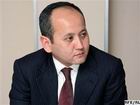 (SRI) - Assets controlled by the ex-chairman of Kazakhstan's BTA Bank Mukhtar Ablyazov are concentrated primarily in offshore companies registered in the British Virgin Islands, Cyprus and Seychelles, the Russian legal news agency RAPSI reported on Tuesday.
(SRI) - Assets controlled by the ex-chairman of Kazakhstan's BTA Bank Mukhtar Ablyazov are concentrated primarily in offshore companies registered in the British Virgin Islands, Cyprus and Seychelles, the Russian legal news agency RAPSI reported on Tuesday.
The court-appointed administrator reportedly has a list of approximately 600 companies controlled by Ablyazov, RAPSI reported, citing documents compiled by the High Court in London.
The London court appointed KPMG as receiver over Ablyazov's assets in August 2010 and upheld the order in December 2010, saying that Ablyazov "cannot be trusted" not to dissipate assets which BTA claims are not his.
Ablyazov faces an embezzlement case at the High Court, amid allegations that he misappropriated up to $4 billion of BTA's money.
KPMG continues to seek answers from Ablyazov about his assets, RAPSI reported. Ablyazov, on his part, said that he is prepared to provide the information as long as the court restricts access to it from BTA representatives, according to RAPSI.
In May, BTA asked the U.K to arrest Ablyazov for violations of the receivership order.
"The bank is seeking to have Mr. Ablyazov committed to prison for what the bank considers to be numerous breaches of injunction orders made against him in the court actions," BTA said in a statement in May.
Besides the U.K., Ablyazov faces embezzlement charges in Russia and Kazakhstan. The current management of BTA, which had been taken over by the state-owned holding and investment company Samruk-Kazyna, claims that Ablyazov and his accomplices stole billions of dollars from the once largest bank in Kazakhstan, leaving it on the verge of bankruptcy.
In Russia, Ablyazov has been charged on four counts of financial crime, and a warrant for his arrest has been issued. In Kazakhstan, the Prosecutor General's Office (PGO) filed 90 charges against the former chairman of BTA Bank and is seeking recovery of $7.5 billion. The PGO has also requested Ablyazov's extradition to Kazakhstan from the UK.
BTA became the largest lender in Kazakhstan to default on its debt in April 2009, shortly after the Kazakh government had taken over the bank, amid allegations of fraud, embezzlement and political revenge. In September 2010, the bank completed the largest ever emerging markets debt restructuring, reducing its $16.7-billion debt to $4.2 billion.
silkroadintelligencer.com




